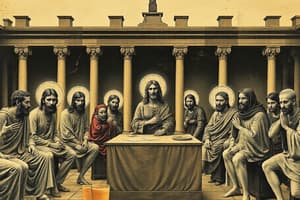Podcast
Questions and Answers
What was the primary concern driving the Sanhedrin's deliberation regarding Jesus?
What was the primary concern driving the Sanhedrin's deliberation regarding Jesus?
- The potential disruption to local trade routes caused by Jesus' growing following.
- The personal animosity between the high priests and Jesus due to past confrontations.
- The risk of Roman intervention and subsequent destruction of the Jewish nation and holy place. (correct)
- The theological implications of Jesus' teachings on established religious doctrines.
Why did Caiaphas advocate for Jesus' death, according to the text?
Why did Caiaphas advocate for Jesus' death, according to the text?
- Caiaphas reasoned that sacrificing one individual was preferable to the destruction of the entire nation. (correct)
- Caiaphas had received a direct order from the Roman authorities to eliminate Jesus.
- Caiaphas believed Jesus was a direct threat to his personal authority and power as high priest.
- Caiaphas was concerned about maintaining social order and preventing widespread chaos.
What does St. John's account suggest about the Sanhedrin's actions following Caiaphas' statement?
What does St. John's account suggest about the Sanhedrin's actions following Caiaphas' statement?
- The Sanhedrin resolved to further investigate Jesus' miracles before taking any definitive action.
- The Sanhedrin immediately attempted to arrest Jesus but were unsuccessful due to his widespread support.
- The Sanhedrin decided to publicly debate the merits of executing Jesus to ensure a fair trial.
- The Sanhedrin began to formulate a plan to execute Jesus. (correct)
How can Caiaphas's rationale be interpreted from a political perspective, considering the historical context?
How can Caiaphas's rationale be interpreted from a political perspective, considering the historical context?
Considering the Sanhedrin's fear of Roman intervention and Caiaphas's proposed solution, what does this suggest about the Sanhedrin's perception of their own power and autonomy?
Considering the Sanhedrin's fear of Roman intervention and Caiaphas's proposed solution, what does this suggest about the Sanhedrin's perception of their own power and autonomy?
How did Jesus' baptism differ from typical baptisms performed by John the Baptist, according to the Catechism of the Catholic Church?
How did Jesus' baptism differ from typical baptisms performed by John the Baptist, according to the Catechism of the Catholic Church?
What is the significance of Jesus staying for days after his baptism by John?
What is the significance of Jesus staying for days after his baptism by John?
Why is Jesus referred to as the 'Lamb of God' by John the Baptist in the context of introducing Jesus to his followers?
Why is Jesus referred to as the 'Lamb of God' by John the Baptist in the context of introducing Jesus to his followers?
How did Jesus' understanding of the Messiah differ from common expectations, and how did his baptism reflect this?
How did Jesus' understanding of the Messiah differ from common expectations, and how did his baptism reflect this?
What dynamic does the encounter where John identifies Jesus as the Lamb of God reveal about the nature of discipleship and spiritual recognition?
What dynamic does the encounter where John identifies Jesus as the Lamb of God reveal about the nature of discipleship and spiritual recognition?
Flashcards
Jesus' Baptism
Jesus' Baptism
Jesus accepting his mission as God's suffering Servant.
Why Jesus sought baptism
Why Jesus sought baptism
To publicly declare the start of his ministry after his quiet years in Nazareth.
Jesus's Vocation as Messiah
Jesus's Vocation as Messiah
He accepted baptism as signifying death for the remission of sins, validated by God.
John the Baptist's Disciples
John the Baptist's Disciples
Signup and view all the flashcards
First Encounter with Jesus
First Encounter with Jesus
Signup and view all the flashcards
What is the Sanhedrin?
What is the Sanhedrin?
Signup and view all the flashcards
Why were the Jewish leaders worried?
Why were the Jewish leaders worried?
Signup and view all the flashcards
Who was Caiaphas?
Who was Caiaphas?
Signup and view all the flashcards
What was Caiaphas's rationale?
What was Caiaphas's rationale?
Signup and view all the flashcards
What was the result of the Sanhedrin's deliberation?
What was the result of the Sanhedrin's deliberation?
Signup and view all the flashcards
Study Notes
- Zechariah was called to serve in the Temple in Jerusalem.
- Herod the Great had undertaken a major expansion and renovation of the Temple.
- The Temple project failed to increase the popularity of the cruel ruler.
- Herod was a non-Jew who owed his kinship to the Roman occupiers of Palestine.
- Zechariah was performing the afternoon ritual of offering incense in the Holy Place.
- The Holy Place was the second most sacred section of the Temple.
- An angel appeared to Zechariah and identified himself as the Archangel Gabriel.
- Gabriel told Zechariah that his prayer was heard, and his wife Elizabeth would bear a son named John.
- John would grow up to resemble the great prophet Elijah.
- John would be the forerunner of God’s Anointed One, the Messiah.
- John would preach a message of repentance and conversion to the people.
- Zechariah asked for a sign to prove these things would come to pass.
- Gabriel was not pleased and identified himself as standing in the presence of God; he was sent to Zechariah.
Studying That Suits You
Use AI to generate personalized quizzes and flashcards to suit your learning preferences.



